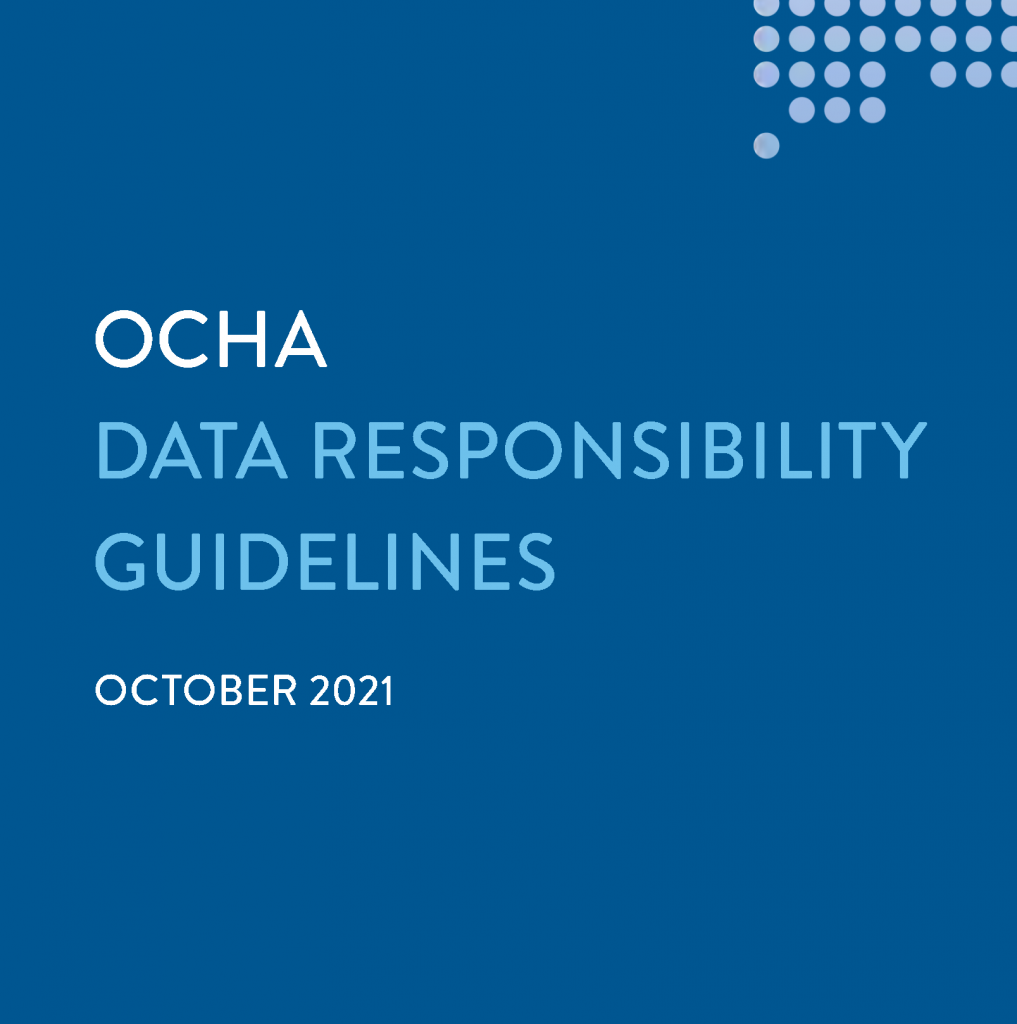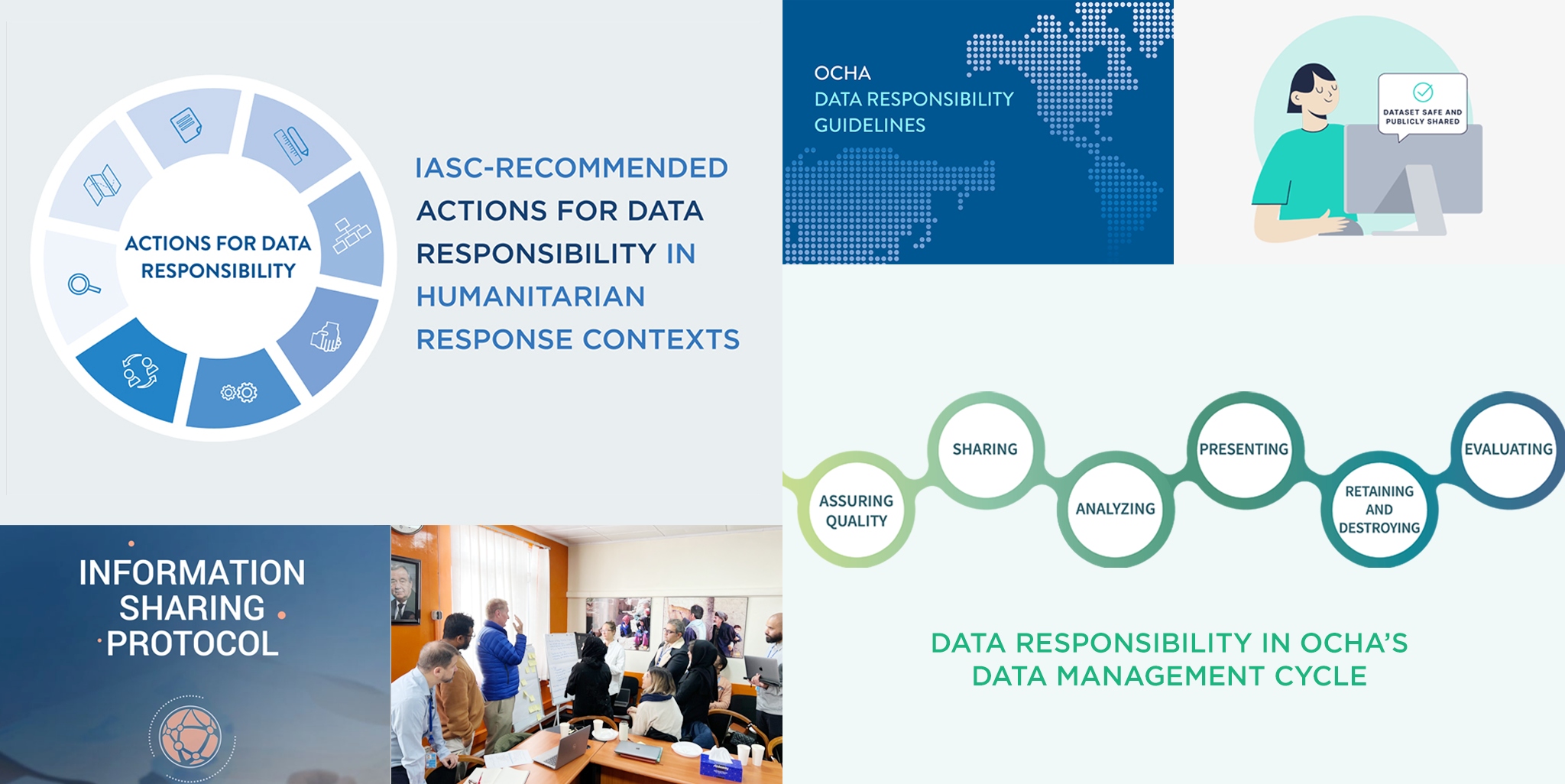Data responsibility in humanitarian action is the safe, ethical and effective management of personal and non-personal data for operational response. It is a critical issue for the sector to address and the stakes are high: the disclosure of sensitive data can lead to already vulnerable people and communities being further harmed or exploited. In addition to avoiding harm, responsible data management can lead to increased trust among humanitarian actors and with the people they seek to serve.
OCHA’s role as data aggregator offers us a unique perspective into the multiple dataflows that exist within a crisis response and the many ways data is managed. The Centre’s data responsibility work focuses on supporting adoption of data responsibility in OCHA and the wider sector. It also aims to help humanitarians navigate the technical and ethical issues involved when working with data in complex environments.
This work is based on the guidance that has been introduced over the past two years: the IASC Operational Guidance on Data Responsibility (first endorsed in February 2021 and revised in April 2023) and the OCHA Data Responsibility Guidelines (agreed in October 2021).

Supporting Adoption
In the two years since the Operational Guidance was first endorsed, humanitarians in 21 out of 30 countries with a Humanitarian Response Plan (HRP) have adopted one or more actions for data responsibility. The most frequently adopted actions to-date are Information Sharing Protocols (ISPs) and designing for data responsibility. ISPs serve as the primary reference document governing data and information sharing in a response.
Status of Information Sharing Protocols
The Centre offers a range of support services including training, missions and adaptation of tools and templates to different settings and languages. We reinforce these efforts by working in closer proximity to operational contexts, disseminating best practices and developing scenario-based learning for OCHA staff and partners. We also work closely with teams across OCHA to integrate data responsibility approaches into cross-cutting issues such as access, accountability to affected people and cash assistance.
The Centre has also worked with a range of partners since 2019 to publish a series of guidance notes and tip sheets on data responsibility. This series offers advice on specific issues related to data responsibility in practice. This series was supported in 2019 and 2020 by the Directorate-General for European Civil Protection and Humanitarian Aid Operations (DG ECHO) and continued from 2021 to 2023 with support from the Government of Switzerland.
Due to its management of HDX, the Centre is aware of the various types of sensitive data that are collected and used by our partners to understand and respond to needs in humanitarian operations. As part of the HDX Quality Assurance (QA) process, we work with context experts to determine the level of sensitivity and appropriate mechanisms for sharing different types of data. Likewise, when survey data is shared on HDX we assess the re-identification risk and review the data to ensure the location and characteristics of vulnerable groups are not exposed.
Collective Action and Partnerships
Recognizing the need for common approaches, the Centre facilitates collective action on the evolution and implementation of system-wide frameworks for data responsibility. This work builds on the collaborative efforts spearheaded by the Centre around the development of the IASC guidance through the global Data Responsibility Working Group (DRWG), which the Centre co-chairs with the Danish Refugee Council, the International Organization for Migration (IOM) and the UN High Commissioner for Refugees (UNHCR).
We also work to build trust through dialogue by convening conversations about data responsibility and related issues within its global network. This includes our participation in the Humanitarian Data and Trust Initiative (HDTI), which the Centre, the International Committee of the Red Cross (ICRC) and the Government of Switzerland launched in September 2020. The HDTI aims to connect technological expertise with policy research and catalyze collective action on data responsibility. Learn more about the HDTI here.
Resources
- Data Responsibility in Humanitarian Action Two Pager
- UN Secretariat Data Protection and Privacy Policy
- “Responsible Data Sharing Between Humanitarian Organizations and Donors: Toward a Common Approach” (Humanitarian Law & Policy)
- “Data Sharing Between Humanitarians and Donors” (Norwegian Centre for Humanitarian Studies)
- “Not a Target! How to Protect Humanitarian Organizations in the Digital Space?” (In Conversation With podcast)
- “Data Incidents: Design with Responsibility in Mind” (Digital Impact Podcast about Data Incident Management)
- UN Personal Data Protection and Privacy Principles
- Handbook on Data Protection in Humanitarian Action (ICRC and Brussels Privacy Hub)
